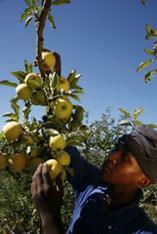
The harvest is over for another year at Vuki Farming Pty Ltd in the Overberg region of the Western Cape, South Africa - a black worker-owned fruit farm that has been Fairtrade certified since 2004.
Fruit picking takes places in March at Vuki, which is a Sesotho word meaning, literally translated, to stand up. The use of the word, however, implies “arise, be awake. Go and do something for yourself”. Very apt, since the farm is owned by 38 permanent workers, who formed the Vuki Trust and successfully secured funding to buy the 318-hectare farm five years ago, after it went into liquidation. Today, Vuki produces Fairtrade-certified apples and pears, which are sold in various supermarkets including Sainsbury’s and Waitrose.
With all eyes on South Africa in the coming months as the country hosts its first FIFA World Cup, the Fairtrade Foundation sees this as an enterprising fruit project that has been successful in working with producers to meet not only Fairtrade standards but also the requirements based on the black economic empowerment policies (B-BBEE) of the South African government.
The objective of the Broad-Based Economic Empowerment Act 53 of 2003 is to establish a legislative framework for the promotion of economic empowerment throughout the black population, giving them more access to opportunity and to change the racial composition of ownership, management and skilled occupations.
The aim of Fairtrade is the economic and social development of small-scale farmers and workers on plantations. Producers have to comply with Fairtrade standards in order to become certified. Fairtrade standards state that if national legislation sets a higher standard on an issue than the Fairtrade Labelling Organisation (FLO), then the higher standard supersedes FLO standards. Therefore, FLO-CERT implemented a new policy for South Africa (effective from 1 September 2007), which adopts the codes of B-BBEE to measure the levels of worker empowerment.
There are a large number of Fairtrade projects in South Africa, including a South African citrus project with Sainsbury’s. Comic Relief has provided funding for Fair Trade South Africa, one of the Fairtrade movement’s newest initiatives set up to support and strengthen the fair trade movement in South Africa and to facilitate access to national and international markets for South African Fairtrade producers.
Vuki produces a range of apple varieties including Granny Smith, Golden Delicious, Royal Gala, Braeburn and Cripps Pink. The farm also grows pears and wine grapes, producing in total around 6,000 tonnes (approximate figures based on 2009 harvests) of fruit, of which approximately 40 per cent is sold on export markets, and more than 14 per cent as Fairtrade. Since 2006, the Vuki Joint Body has received approximately £90,000 in Fairtrade premiums, which have generated a diverse range of social, educational and economic projects, including higher education bursaries, to support a clinic and crèche, sports activities, women’s clubs that make crafts to sell and an emergency fund to provide help during hard times. However, one of the most exciting projects has been the Adult Basic Education and Training classes to enable people to attain basic levels of literacy. Vuki has also received additional support from the Waitrose Foundation.
The difference Fairtrade has made is summed up by Eliot Tshapile, who is a member of the joint body and has been working at Vuki since 1984, under its previous owners. He says: “I wish people in the UK could see the impact that the Fairtrade premium has made on people’s lives here. As a farm worker, it’s not easy when your child finishes secondary school and you are not able to afford to pay for tertiary education. However, funding from the premium has made it possible for us to send our children to higher education and to continue to better themselves.”



